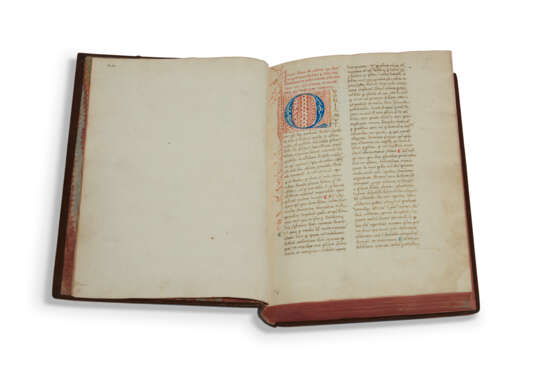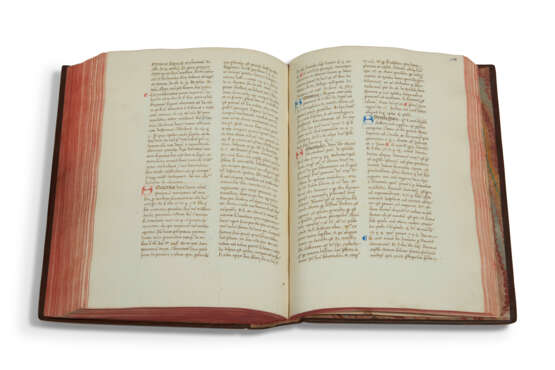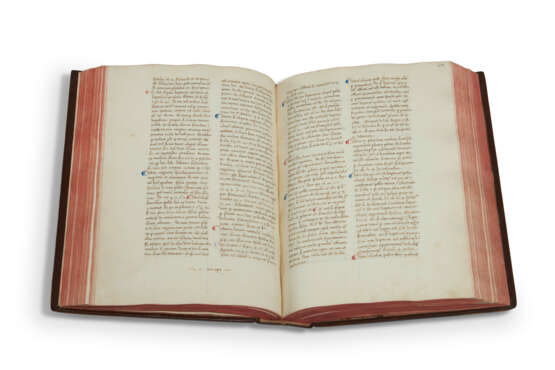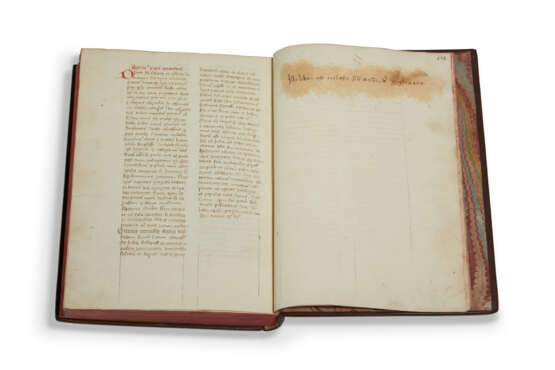ID 869529
Lot 122 | Bartolomeo Pisano (d. 1401)
Estimate value
£ 6 000 – 9 000
Summa de casibus conscientiae, in Latin, decorated manuscript on paper [Italy, second half 15th century (after 1446)].
An influential work on moral guidance and canon law written by the Dominican preacher and teacher Bartolomeo Pisano, with early ecclesiastical provenance.
271 x 192mm. ii + 272 + ii leaves, complete, collation: 1-310, 44, 5-710, 814, 9-1310, 1412, 15-2010, 2112, 22-2710, 2 columns of 37 lines, ruled space: 204 x 59mm per column, rubrics in red, initials and paraphs alternately red or blue throughout, one large penwork initial extending into the margin (small tear to lower corner of f.1, very occasional marginal thumbing and smudging, else in excellent condition). 19th-century brown calf, spine gilt.
Provenance:
(1) Cathedral of Sant' Ambrogio, Vigevano, Lombardy, 16th-century inscription on f.272: ‘Iste liber est ecclesie S[an]cti Ambr[osii] de Viglevano’.
(2) According to Colker, from the collection of Lord Suffield (perhaps Edward Harbord, 3rd Baron Suffield, 1781-1835).
(3) Colker MS 8; acquired in 1944 from Maggs; Faye & Bond, Supplement to de Ricci’s Census (1962), pp. 516–17.
Content:
Bartolomeo Pisano, Summa de casibus conscientiae, beginning: ‘Quoniam ut ait G[re]g[orius] sup[er] Ezechiele[m] [...]’ (f.1) and ‘Abbas in suo monastero conferre’ (f.1v) and ending: ‘Invidia p[ara] 2. Deo gra[tia]s. Laus tibi sit xe qui[ntus] lib[er] explicit iste’ ff.1-268v; Tables ff.268v-271; Eugenius IV (1431-1447), Bulla de communione pascali, beginning ‘Dilecte fili salutem et ap[osto]licam b[e]nedictione[m]’ and ending ‘VIII kal. Julii 1446, pontificatus nostri anno XVI°’ f.271v.
Bartolomeo Pisano or Bartolomeo da San Concordio entered the Dominican Order in 1277. He studied at Bologna and Paris, and was lector logicae in several convents before returning to Pisa around 1330, where he remained until his death. He was renowned as a preacher, a poet in Latin and Italian, and a teacher in canon and civil law. His most influential work, and the most popular, was the Summa de casibus, an alphabetically arranged digest of moral guidance and canon law, which was used throughout the 14th and 15th centuries. Several editions were printed in the 15th century, the earliest in Italy in 1473 (GW 33450, IGI 1267).
| Genre: | Religious genre |
|---|---|
| Auction house category: | Medieval & renaissance manuscripts |
| Genre: | Religious genre |
|---|---|
| Auction house category: | Medieval & renaissance manuscripts |
| Address of auction |
CHRISTIE'S 8 King Street, St. James's SW1Y 6QT London United Kingdom | |
|---|---|---|
| Preview |
| |
| Phone | +44 (0)20 7839 9060 | |
| Buyer Premium | see on Website | |
| Conditions of purchase | Conditions of purchase |






